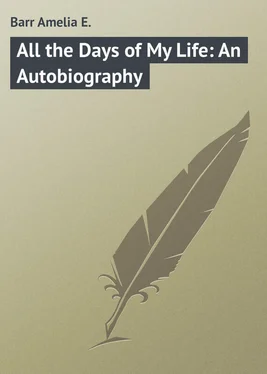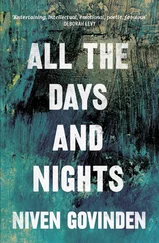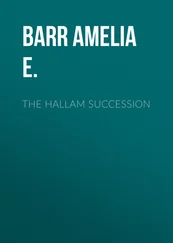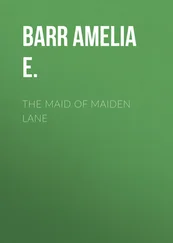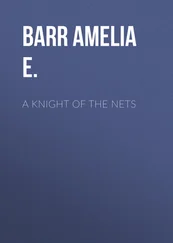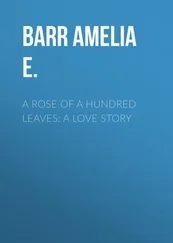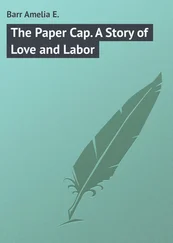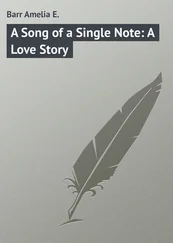Amelia Barr - All the Days of My Life - An Autobiography
Здесь есть возможность читать онлайн «Amelia Barr - All the Days of My Life - An Autobiography» — ознакомительный отрывок электронной книги совершенно бесплатно, а после прочтения отрывка купить полную версию. В некоторых случаях можно слушать аудио, скачать через торрент в формате fb2 и присутствует краткое содержание. Жанр: foreign_prose, foreign_language, на английском языке. Описание произведения, (предисловие) а так же отзывы посетителей доступны на портале библиотеки ЛибКат.
- Название:All the Days of My Life: An Autobiography
- Автор:
- Жанр:
- Год:неизвестен
- ISBN:нет данных
- Рейтинг книги:5 / 5. Голосов: 1
-
Избранное:Добавить в избранное
- Отзывы:
-
Ваша оценка:
- 100
- 1
- 2
- 3
- 4
- 5
All the Days of My Life: An Autobiography: краткое содержание, описание и аннотация
Предлагаем к чтению аннотацию, описание, краткое содержание или предисловие (зависит от того, что написал сам автор книги «All the Days of My Life: An Autobiography»). Если вы не нашли необходимую информацию о книге — напишите в комментариях, мы постараемся отыскать её.
All the Days of My Life: An Autobiography — читать онлайн ознакомительный отрывок
Ниже представлен текст книги, разбитый по страницам. Система сохранения места последней прочитанной страницы, позволяет с удобством читать онлайн бесплатно книгу «All the Days of My Life: An Autobiography», без необходимости каждый раз заново искать на чём Вы остановились. Поставьте закладку, и сможете в любой момент перейти на страницу, на которой закончили чтение.
Интервал:
Закладка:
Mother was wretched. She put down her work, and I went to her. “What does Father mean?” I asked.
“He means that we shall now be poor, Milly. This money stolen from him was the best part of our living. I do not know how much it was, for he never told me the amount, and often I have advised him to put it in some reputable bank. But Philip Blackpool was his friend, at least he supposed so. I have always doubted it. We must send away one servant to-morrow; we shall have to do with much less new clothing, and many good things that we have thought necessary, we must learn to do without. Great changes will have to be made; my dear girls, let us make them cheerfully.”
Then I spoke to Mother about turning my education into money, and she was pleased with my readiness. “Father is ill,” she said, “and I fear he will not be able to preach much longer. I have thought of these things often,” she continued, “and wondered how we were to live, when he had only his retiring income, and this idea has come to me – that if we knew how to conduct a small ladies’ boarding-school, it might suffice. Jane and I could look after the house and children, and you, Milly, could, with the help of teachers, conduct the school. Of course you would have to be trained for such a task.”
We were all pleased with this idea, and discussed it over our tea, in which Father did not join us. Then it appeared that this school project was an old thought with Mother. She asked us if we remembered a certain Miss Sarah Berners who stayed a week with us when we were in Penrith, adding, “She was my friend through all the years in which I was at school, and we used to talk of starting a school together, and being independent of our stepmothers; for we both had stepmothers, and not very kind ones – but I married, you know.”
“Yes,” said Jane, “and what did Miss Berners do?”
“She opened a school at Downham Market, Norfolk, fifteen years ago, and has done well. Suppose, Milly, you went to her for a year, and learned how to manage a school.”
I answered, “I would like to do so, Mother. I would like it very much.”
So Mother wrote to Miss Berners, and received a glad consent to her wish. I was to go as second teacher, and assist in the music, drawing and English classes; and she promised to give me twenty-five pounds a year with my board and lodging, and the opportunity to study the French language if I wished, as I would room with Miss Stromberg, a Russian, who spoke it, and nearly every other European language, perfectly.
When this news came, Father was told of our plans. There was some opposition, but not much, and I began with a hopeful heart to prepare for the change before me. This event appeared to break up the storm of sorrow and ill fortune which had assailed us. We had feared Father’s next appointment lest it should be some large manufacturing city, demanding more strength than he had to give, but when it came, it was to Kendal. Nothing could have been better. It was my mother’s birthplace; she had many friends there, and my father was a great favorite with Kendal Methodists; and there was a pleasant preacher’s house in a pretty garden, surrounded by poplar trees.
It was a joyful removal. We bid farewell to the little graves we had to leave behind us, and then turned our faces, as it were, homeward. And as I was not wanted in Norfolk, until early in September, I went to Kendal with my family, and helped to settle them in their new home. I was very happy in my own prospects. I had no fears, and I had a great many hopes and pleasant expectations. My life was yet to me like a book of uncut leaves. I had finished the preface, and the first chapter was to open in Norfolk. I put behind me all past sorrows, and was just an eager girl leaning over the narrow rim of my small world, and gladly anticipating the wide, wide world into which I was going. And I was made strangely happy, because on the night before I left home, when I lifted the little red Bible that lay upon my dressing-table, my eyes lighted on this verse, “Fear not: for I have redeemed thee, I have called thee by thy name; thou art mine.” (Isaiah, 43:1.)
CHAPTER VI
IN NORFOLK
“No one knows what capacities they have for doing and suffering till the occasion comes. When water is ice, we have no idea what latent heat is in it.”
“Life – all things here are but beginnings.”
I was sixteen years and five months old, when I left home to go to Downham Market, and take my place among the workers of the world. The thought pleased me. I was tired of being a mere looker-on at life’s great game, and wanted my share in it. It was on the fourth of September, A.D. 1847, and my father was to go as far as Hull with me. There he would see me on board a little steamer sailing down the Wash to Lynn Regis, from which place a carriage would carry me the few miles inland to Downham Market.
I had put on long dresses that morning, and coiled my hair in a knot under my bonnet, and looked quite eighteen; and I think Father was proud of me. I certainly was very proud of Father’s company; not entirely because of his beautiful countenance, I valued far more, that air of distinction which never left him, and to which every one deferred. We had a pleasant journey to Hull, where we arrived soon after noon. I had wondered why this way to Downham Market had been chosen for me, but as soon as we reached Hull, I knew why. It was a large seaport, excepting London and Liverpool, the largest in England; and Father wanted me to see the ancient town, and its wonderful docks.
We went to an hotel and had lunch, and then to the Queen’s and Humber docks, and I got my first glimpse of what a great commercial city must be on its water side. I heard all the languages of Northern Europe on those great walls. I saw woolpacks from Germany; hides, hemp and tallow from Russia; corn from Dantzic, and other Baltic ports; and strange thin bars of iron from Sweden. Father told me this metal would all go to Sheffield to be made into steel. On the Humber dock I saw great bales of cotton and woolen cloth from Manchester and the West Riding of Yorkshire; and other bales of lace and net, from Nottingham. They were going to France and Germany, and all over Northern Europe.
After the docks, we went to the famous Trinity House, a very rich and powerful guild, that supports disabled seamen of the merchant service and their widows, and has been doing this good work for nearly five hundred years. For it is not only wealthy in bequeathed property, but receives a shilling a month from the wages of all seamen leaving the port. We went through the wonderful old place, and were told there were nearly one hundred inmates, and nearly one thousand outside pensioners. The whole place was as clean and neat as the decks of a man-of-war and every apartment, even the council room, was strewn with fresh green rushes, after the fashion of the days of its erection.
I noticed in the entrance hall a Greenland kayak hung from the ceiling. It was picked up at sea with a man in it in A.D. 1613. The man refused to eat, and died in a few days; but the figure in the kayak wears his clothes, et cetera. I made some remark to Father afterwards about Hull sailors being in such a latitude at that date, and he said “they were commonly there then, and indeed were famous whalers as early as A.D. 1590.”
“Are they whalers now?” I asked.
“They are not extinct as whalers even now, though they are fast passing away. Why, Milly,” he added, “it was the whaler Isabella , Captain Humphries, from the port of Hull, that found and saved Sir John Ross and his company of Arctic explorers, after they had been shut up in the ice for four years. He brought them home with him to Hull, and Hull gave them a grand triumph, opened their hearts and homes to them, and the whole nation went into rejoicing. You were only two years old then, Milly, and do not remember, but I do. They had won nothing; they had lost every thing, but they had endured cheerfully till their deliverance came; and endurance is victory . Don’t forget that, Milly.”
Читать дальшеИнтервал:
Закладка:
Похожие книги на «All the Days of My Life: An Autobiography»
Представляем Вашему вниманию похожие книги на «All the Days of My Life: An Autobiography» списком для выбора. Мы отобрали схожую по названию и смыслу литературу в надежде предоставить читателям больше вариантов отыскать новые, интересные, ещё непрочитанные произведения.
Обсуждение, отзывы о книге «All the Days of My Life: An Autobiography» и просто собственные мнения читателей. Оставьте ваши комментарии, напишите, что Вы думаете о произведении, его смысле или главных героях. Укажите что конкретно понравилось, а что нет, и почему Вы так считаете.
